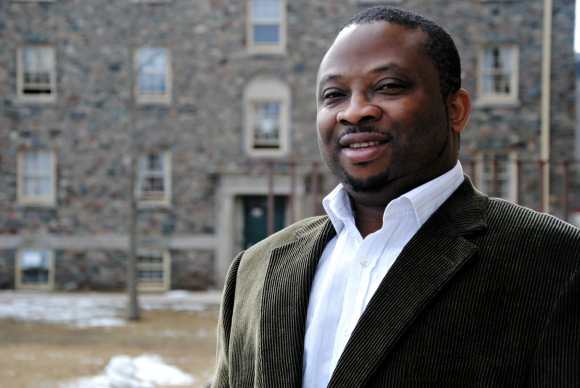
A scar on the arm of Kaanayo Nwachukwu, a one-year journalism King’s student from Nigeria, reminds him daily of two weeks he spent in jail in August 1994.
Nwachukwu was born and raised in Nigeria, where he was the oldest of six children. He grew up in poverty, living in a 10 by 12 foot mud thatch hut “like the one you see on your screen every Sunday.” He slept on a bedbug-infested double bed with his siblings, while his parents and grandmother slept on the hard floor. His father died when Nwachukwu was young, so he had to put his siblings through school.
He completed school, pre-school through to university, in Nigeria, graduating with a bachelors degree in language linguistics at Abia State University.
After graduating, he did a year of military service, also known as youth service, required for Nigerians who pass through a Nigerian university and are 30 years old or younger. “If you don’t want to do (youth service), that’s okay. But you never get government jobs, you don’t get employed by the government, and you don’t get to contest in any elections. Technically if you don’t do that, you’ve kind of given up your citizenship,” said Nwachukwu.
Nwachukwu was hired to be a reporter with an alternative nation wide news magazine that provided news seperate from what the from military government tried to prescribe. As somebody who likes to stand in the front and not hang back in the shadows, he would help organize rallies against the government. “I didn’t like the system. I was poor, looking for an easy way out of poverty. You get to blame the government for everything that has gone wrong in your life. I started pushing and pushing and pushing,” said Nwachukwu.
He was sent to Jos, Plateau State, a Muslim area in northern Nigeria, for military service. In August 1994, he heard a knock on the door. To his surprise, he was arrested and charged for belonging to a secret cult. The dictatorship charged people they thought were enemy of the state. For Nwachukwu, “that was a very frivolous excuse because we knew how the system works.” While in jail, he was tortured as they tried to force him to admit he belonged to a cult so they could put him in a military trial. He was water boarded and not fed during those two weeks. “I came pretty close to giving up the ghost but I said, “No, I have more things to do in this life then just succumb to torture’,” said Nwachukwu. “I knew I was going to see my mom again. I wanted to see my siblings and friends again. For me these were the driving forces that helped me remain focused and hopeful that I wasn’t going to die.”
His arrest became a hot topic in the media after his friends tried to find him but couldn’t. After this attention, he was released. Even after his release, Nwachukwu was continually harassed by the military.
On his arm, Nwachukwu has a scar from a Swiss army knife-like weapon. His arm was cut by air force squadron leader D.S. Bello, who told Nwachukwu, “I’m going to give you something so that you will never forget me.” Looking at the scar, he doesn’t hold any bitterness. “This is one of those prices you have to pay to be who you are. I’m not angry, I’m not upset, it’s just the way it is,” said Nwachukwu.
Last year on a visit to Nigeria, he went looking for Bello, but found out he had died nine years ago. Nwachukwu says this makes the whole thing more painful because he didn’t get the closure he is looking for. He hopes to meet the Bello’s family one day. “It would be nice to get to know them and tell them what happened and express that I’m not holding it against them.”
After 21 years in Nigeria, Nwachukwu moved around several different countries before coming to Canada in 1999. He wanted to come to Canada after his uncle studied there and was a “big guy” when he came back. He has been a news junkie since childhood. Growing up, one of his family’s only possessions was a Panasonic shortwave radio that would pick up a few stations including BBC News. After finishing his journalism degree at King’s, he wants to become a media consultant in Nigeria. He is also working on an African politics blog with a focus on Nigeria.
“Africa’s my home. I’m a product of the two countries. I’m so proud that’s the way it is.”
The original print and online versions of this article spelled Kaanayo Nwachukwu’s name incorrectly. We regret the error.
Categories
Significant Scar
A scar on the arm of Kaanayo Nwachukwu, a one-year journalism King’s student from Nigeria, reminds him daily of two weeks he spent in jail in August 1994.